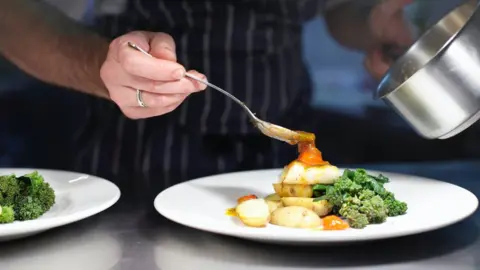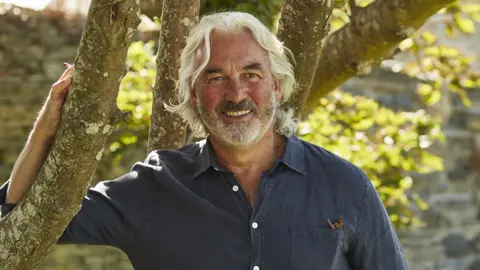Calories on menus 'will cost thousands of pounds'
 Getty Images
Getty ImagesRestaurants say plans to display the calorie content of food on menus in England should be delayed while the sector recovers from the pandemic.
There are fears that the move will add extra costs to businesses at a time when they are least able to afford it.
The new rules will affect restaurants, cafes and takeaways employing more than 250 people and are due to come in from April 2022.
The change is part of a drive by the UK government to tackle obesity.
With 11 restaurants, Mowgli Street Food's founder Nisha Katona says making the changes by next spring will mean a significant investment.
"It's thousands of pounds and weeks of work," she says. "It's a shame for anyone to have to take on another cost right now."
However, she supports the idea that people should take a greater interest in how many calories they consume when they eat out, and says her restaurant has already looked into displaying calories on its menus.
Despite this, she believes it's crucial that ministers stick to the idea of only applying the new rules to larger businesses such as hers.
"Personally, I can see the value in it, and it's something my business will manage to do - but it'll see the end of small restaurants if they're ever compelled to do it," she says.
Announcing the plans, Public Health Minister Jo Churchill said they were intended "to make it as easy as possible for people to make healthier food choices for themselves and their families, both in restaurants and at home".
The government said that it would not affect small, independent businesses, which may find it harder to implement the changes.
'Survival mode'
Kate Nicholls, chief executive of trade body UK Hospitality, says that while the industry shares the government's objectives in improving public health, the timing could prove difficult.
"The majority of operators are in survival mode," she says.
"We urge the government to consider delaying the implementation of any legislation rather than layering on new costs for businesses in a sector that has been hardest hit by the pandemic and risks prolonging their recovery and business' ability to invest and create jobs."
 Loungers
LoungersThat's a view echoed by Nick Collins, chief executive of Loungers, who run the Lounge and Cosy Club chain of more than 140 café-bars.
"The timing really is dreadful," he says. Having only just been able to fully reopen, he says businesses like his are focused on their recovery and their staff - and a change like this will take time to implement.
"I support the objective of helping our customers eat more healthily," he says, "but I'd like to see it put back. It's red tape we could really do without."
A spokesperson from the Department for Health acknowledged the impact of Covid-19 on the hospitality sector, and pledged to "work with businesses and local authorities to ensure the out of home calorie labelling regulations are implemented as smoothly as possible".
Daily specials
Some High Street chains already publish information about the calorie content of their food on their menus, including Wetherspoons pubs and The Real Greek restaurants.
But others argue that the nature of their restaurants will make a change like this even more costly.
Robin Hutson, chairman of The Pig hotels and restaurants, says his business cooks with fresh produce that changes on a daily basis - and thinks the plans show "a crass lack of understanding from the government".
He has eight venues across the South of England, with about 950 staff.
 Jake Eastham
Jake Eastham"High Street chains may never change their menus - but ours can change between lunch and dinner," he explains.
"Are we supposed to employ someone to update our menus all the time? It's just more financial pressure on an already embattled sector."
Furthermore, he doesn't believe it's fundamentally a role restaurants should be talking on.
"What people eat and drink is down to them," he says. "We should all be taking responsibility for ourselves."
The government estimates that overweight and obesity related conditions cost the NHS £6.1bn each year, and data shows that almost two-thirds of adults in England are overweight or obese.
A spokesperson for the Department of Health also pointed out the disproportionate effect Covid-19 has on people who are overweight, saying, "it is more important than ever to help people across the country achieve a healthy weight".
